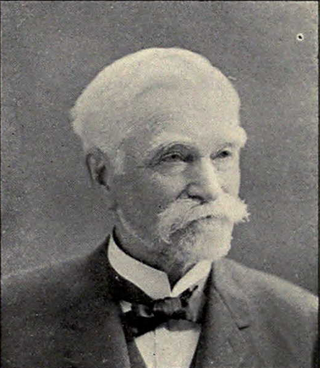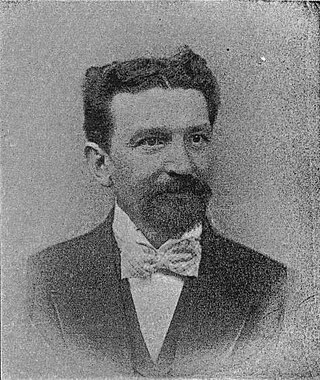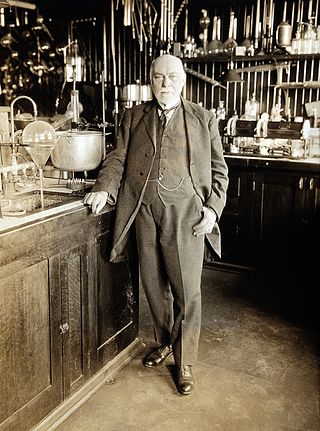
A pharmacist is a healthcare professional who specializes in the preparation, dispensing, and management of medications and who provides pharmaceutical advice and guidance. Pharmacists often serve as primary care providers in the community, and may offer other services such as health screenings and immunizations.

University of the Sciences in Philadelphia, previously Philadelphia College of Pharmacy and Science (PCPS), was a private university in Philadelphia, Pennsylvania. On June 1, 2022, it officially merged into Saint Joseph's University.

Pharmacy is the science and practice of discovering, producing, preparing, dispensing, reviewing and monitoring medications, aiming to ensure the safe, effective, and affordable use of medicines. It is a miscellaneous science as it links health sciences with pharmaceutical sciences and natural sciences. The professional practice is becoming more clinically oriented as most of the drugs are now manufactured by pharmaceutical industries. Based on the setting, pharmacy practice is either classified as community or institutional pharmacy. Providing direct patient care in the community of institutional pharmacies is considered clinical pharmacy.
The Royal Pharmaceutical Society of Great Britain (RPSGB) existed from its founding as the Pharmaceutical Society of Great Britain in 1841 until 2010. The word "Royal" was added to its name in 1988. It was the statutory regulatory and professional body for pharmacists and pharmacy technicians in England, Scotland and Wales. In September 2010, the regulatory powers of the Society were transferred to the newly formed General Pharmaceutical Council (GPhC). The RPSGB became the Royal Pharmaceutical Society (RPS) at that time and retained its professional leadership role; the "Great Britain" part of the name was dropped for day-to-day purposes.
A Doctor of Pharmacy is a professional doctorate in pharmacy. In some countries, it is a doctoral degree to practice the profession of pharmacy or to become a clinical pharmacist. In many countries, people with their Doctor of Pharmacy are allowed to practice independently and can prescribe drugs directly to patients. A PharmD program has significant experiential and/or clinical education components in introductory and advanced levels for the safe and effective use of drugs. Experiential education prepares graduates to be practice-ready, as they already have spent a significant amount of time training in areas of direct patient care and research.
The Royal Pharmaceutical Society is the body responsible for the leadership and support of the pharmacy profession (pharmacists) within England, Scotland, and Wales. It was created along with the General Pharmaceutical Council (GPhC) in September 2010 when the previous Royal Pharmaceutical Society of Great Britain was split so that representative and regulatory functions of the pharmacy profession could be separated. Membership in the society is not a prerequisite for engaging in practice as a pharmacist within the United Kingdom. Its predecessor the Pharmaceutical Society of Great Britain was founded on 15 April 1841.

Albert Benjamin Prescott was an American chemist. He graduated in medicine at the University of Michigan in 1864, and was made assistant professor of organic and applied chemistry, dean of the school of pharmacy, and director of the chemical laboratory over the years. Professor Prescott served as president of the American Chemical Society in 1886, president of the American Association for the Advancement of Science in 1891, and president of the American Pharmacists Association in 1900. During his tenure as Dean at the University of Michigan College of Pharmacy, Prescott encouraged the foundation of what is now the Phi Delta Chi professional pharmacy fraternity. He is buried with his wife and children at Forest Hill Cemetery, adjacent to the University of Michigan Central Campus.
The basic requirement for pharmacists to be considered for registration is often an undergraduate or postgraduate pharmacy degree from a recognized university. In many countries, this involves a four- or five-year course to attain a bachelor of pharmacy or master of pharmacy degree.
Agnes Borrowman was a Scottish pharmaceutical chemist. In 1924 she became the first woman to serve on the Pharmaceutical Society's Board of Examiners.
Auguste-Arthur Plisson was a French chemist. Born in Orléans, Plisson was orphaned at an early age, but overcame the difficulties that caused him with the determination he brought to being a student of chemistry in Paris. Taught by Nöel-Étienne Henry, chief of the Central Pharmacy of Paris Hospitals, he won several awards from the School of Pharmacy of Paris, including a gold medal for chemistry in 1823, and was eventually recruited by Henry to work for the Central Pharmacy. After several years, during which he published a number of papers on chemical discoveries, he was appointed deputy chief. He was also a member of the Société de Pharmacie.
The National Association of Women Pharmacists was founded in London on 15 June 1905, following discussions between Margaret Elizabeth Buchanan and Isabella Skinner Clarke. Early meetings were held at Clarke's home. Membership was restricted to those who had passed the major or minor examination and 50 women joined immediately. By 1912 Buchanan claimed that practically all women practicing pharmacy were members. Buchanan served as its president at one point.
Margaret Elizabeth Buchanan was a British pharmacist and pioneer of women in pharmacy.
Frances Elizabeth Deacon (1837–1930) was an English chemist and druggist who was the first woman to qualify after the 1868 Pharmacy Act, which made registration with the Pharmaceutical Society of Great Britain (PSGB) compulsory in order to work as a pharmacist.

George Sampson Valentine Wills (1849-1932) was a chemist and pharmacist and the founder of the Westminster College of Chemistry and Pharmacy, an institution which prepared students for examinations set by the Pharmaceutical Society of Great Britain, founded in 1841.
Isabella Skinner Clarke–Keer was a British pharmacist and pioneer of women in pharmacy. In 1875, she became the first woman to qualify as a Pharmaceutical Chemist, and was one of the first two women members of the Pharmaceutical Society of Great Britain, admitted in 1879. In 1905, she became the first President of the National Association of Women Pharmacists.
Rose Coombes Minshull (1845–1905) was one of the first two women members of the Pharmaceutical Society of Great Britain (PSGB), admitted in 1879.

Hope Constance Monica Winch was an English pharmacist and academic.

Elsie Higgon was the first Joint Secretary of the (National) Association of Women Pharmacists; researcher for King's College, the British Medical Journal and the British Pharmaceutical Codex; Lecturer in Chemistry at Portsmouth Municipal College; proprietor pharmacist of two businesses in Hampstead, proprietor of the Gordon Hall School of Pharmacy for Women in Gordon Square, and a supporter of the suffrage movement.

Frederick Belding Power was an American chemist who worked in pharmacology, plant chemicals, and on standards in pharmaceutical production. He served as a professor of pharmacy at the Philadelphia College and as director of pharmacy at the University of Wisconsin–Madison. He also served as a chemist for the Wellcome Chemical Research Laboratories in London where he examined Chaulmoogra oil and its use in the treatment of leprosy.
Ella Corfield was a British pharmacist, achieving pioneering academic work in her early career and later business management. She also held senior ranks in the British Red Cross.









